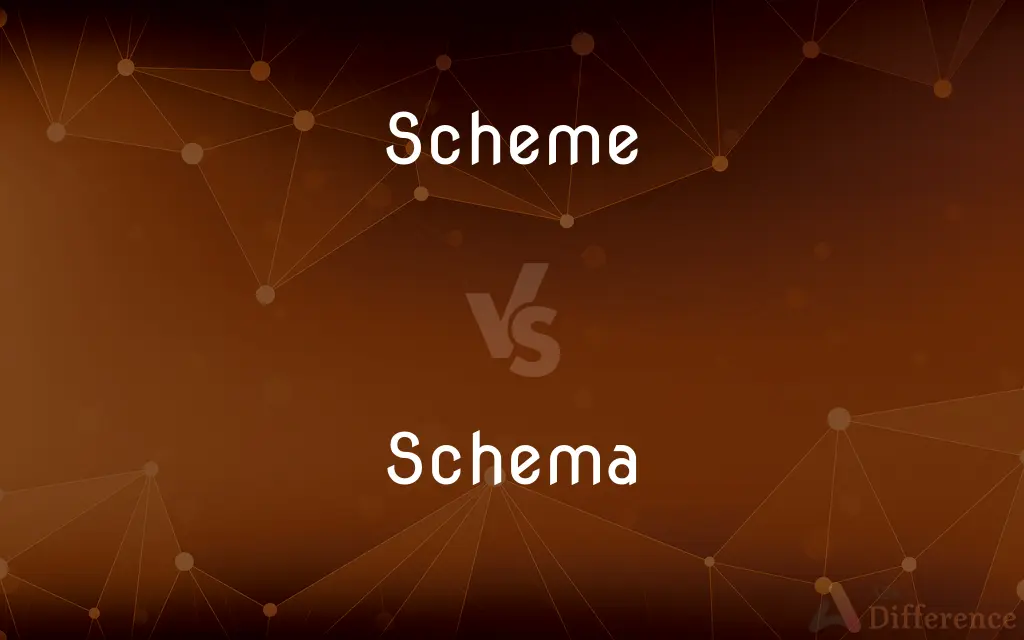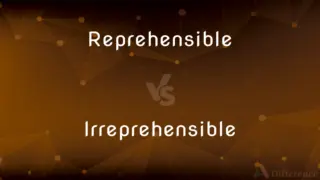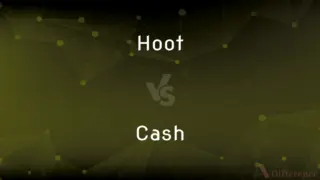Scheme vs. Schema — What's the Difference?
By Tayyaba Rehman — Updated on October 23, 2023
A scheme refers to a systematic plan or arrangement, while a schema is a blueprint or structure representing a complex idea or system.

Difference Between Scheme and Schema
Table of Contents
ADVERTISEMENT
Key Differences
A scheme is generally a plan or program designed to accomplish a specific goal or purpose. This term often conveys an arrangement or systematic approach. A schema, conversely, represents a structured framework, often used to depict complex concepts or systems, especially in the realms of psychology and computer science.
While both words imply organization and structure, their applications differ. A scheme might relate to a business plan, a plot, or even an artistic arrangement. However, a schema leans more towards representing an idea in a simplified or structured manner. In databases, for instance, a schema outlines how data is organized.
Schemes can be both concrete and abstract. You could scheme to achieve a particular outcome or create a color scheme for your room. Schema, meanwhile, often represents abstract models, like a cognitive schema in psychology or a database schema in IT.
The roots of these terms provide additional insight. "Scheme" originates from the Greek "skhēma," denoting form or figure, but over time, its meaning evolved. "Schema," retaining the original Greek connotation, directly implies structure or framework.
In essence, while both scheme and schema convey organization, the former often pertains to plans or arrangements, and the latter describes structured representations of intricate concepts or systems.
ADVERTISEMENT
Comparison Chart
Basic Definition
A systematic plan or arrangement.
A blueprint or structured representation of a complex idea/system.
Common Usage
Refers to plans, plots, or design arrangements.
Depicts complex concepts, especially in psychology and IT.
Application
Can be applied to strategies or artistic designs.
Used to represent abstract models or data organization.
Origins
Derived from Greek, but has evolved in meaning.
Retains its original Greek connotation of structure/framework.
Nature
Can be both concrete and abstract.
Primarily abstract, representing a simplified idea.
Compare with Definitions
Scheme
A systematic plan designed for a specific purpose.
The company unveiled its new marketing scheme.
Schema
A structured framework or plan.
The database schema provided a clear outline of how data was stored.
Scheme
An underhanded plot or strategy.
She was involved in a scheme to defraud the bank.
Schema
An organized pattern of thought or behavior.
Childhood experiences greatly influence one's schema.
Scheme
A design or arrangement, often in terms of color or pattern.
The room’s color scheme was a calming blend of blues and greens.
Schema
A representation of a complex system or concept.
His cognitive schema of the event was distorted by his biases.
Scheme
A formal plan or program of action.
The government introduced a new scheme for affordable housing.
Schema
A blueprint detailing the arrangement of data.
The XML schema detailed the document’s structure.
Scheme
A systematic plan of action
"Did you ever carry out your scheme of writing a series of sonnets embodying all the great epochs of art?" (Edith Wharton).
Schema
A plan, outline, or model
A schema for prioritizing vaccinations.
A writer's schema for a novel.
Scheme
A secret or devious plan; a plot
A scheme to defraud investors.
Schema
(Psychology) A pattern imposed on complex reality or experience to assist in explaining it, mediate perception, or guide response.
Scheme
An orderly plan or arrangement of related parts
An irrigation scheme with dams, reservoirs, and channels.
Schema
An outline or image universally applicable to a general conception, under which it is likely to be presented to the mind (for example, a body schema).
Scheme
A chart, diagram, or outline of a system or object.
Schema
(databases) A formal description of the structure of a database: the names of the tables, the names of the columns of each table, and the data type and other attributes of each column.
Scheme
To contrive a plan or scheme for; plot
Scheming their revenge.
Schema
(markup languages) A formal description of data, data types, and data file structures, such as XML schemas for XML files.
Scheme
To make plans, especially secret or devious ones.
Schema
(logic) A formula in the metalanguage of an axiomatic system, in which one or more schematic variables appear, which stand for any term or subformula of the system, which may or may not be required to satisfy certain conditions.
Scheme
An artful deviation from the ordinary arrangement of words.
Schema
(Christianity) A monastic habit in the Greek Orthodox Church.
Scheme
(astrology) A representation of the aspects of the celestial bodies for any moment or at a given event.
Schema
An outline or image universally applicable to a general conception, under which it is likely to be presented to the mind; as, five dots in a line are a schema of the number five; a preceding and succeeding event are a schema of cause and effect.
Scheme
A systematic plan of future action.
Schema
An internal representation of the world; an organization of concepts and actions that can be revised by new information about the world
Scheme
A plot or secret, devious plan.
Schema
A schematic or preliminary plan
Scheme
An orderly combination of related parts.
Schema
An outline or model that simplifies a complex concept.
She used a schema to help students grasp the intricate theory.
Scheme
A chart or diagram of a system or object.
Scheme
(mathematics) A mathematical structure that enlarges the notion of algebraic variety in several ways, such as taking account of multiplicities and allowing "varieties" defined over any commutative ring (e.g. Fermat curves over the integers).
Scheme
A council housing estate.
Scheme
(internet) Part of a uniform resource identifier indicating the protocol or other purpose, such as
http: or news:.Scheme
A portfolio of pension plans with related benefits comprising multiple independent members.
Scheme
(intransitive) To plot, or contrive a plan.
Scheme
(transitive) To plan; to contrive.
Scheme
A combination of things connected and adjusted by design; a system.
The appearance and outward scheme of things.
Such a scheme of things as shall at once take in time and eternity.
Arguments . . . sufficient to support and demonstrate a whole scheme of moral philosophy.
The Revolution came and changed his whole scheme of life.
Scheme
A plan or theory something to be done; a design; a project; as, to form a scheme.
The stoical scheme of supplying our wants by lopping off our desires, is like cutting off our feet when we want shoes.
Scheme
Any lineal or mathematical diagram; an outline.
To draw an exact scheme of Constantinople, or a map of France.
Scheme
A representation of the aspects of the celestial bodies for any moment or at a given event.
A blue silk case, from which was drawn a scheme of nativity.
He forms the well-concerted scheme of mischief;'T is fixed, 't is done, and both are doomed to death.
Artists and plans relieved my solemn hours;I founded palaces, and planted bowers.
Scheme
To make a scheme of; to plan; to design; to project; to plot.
That wickedness which schemed, and executed, his destruction.
Scheme
To form a scheme or schemes.
Scheme
An elaborate and systematic plan of action
Scheme
A statement that evades the question by cleverness or trickery
Scheme
A group of independent but interrelated elements comprising a unified whole;
A vast system of production and distribution and consumption keep the country going
Scheme
An internal representation of the world; an organization of concepts and actions that can be revised by new information about the world
Scheme
A schematic or preliminary plan
Scheme
Form intrigues (for) in an underhand manner
Scheme
Devise a system or form a scheme for
Scheme
A structure or organized method.
They developed a scheme for sorting the data efficiently.
Common Curiosities
Is schema always related to databases?
No, while commonly used in IT, "schema" can also refer to cognitive frameworks in psychology.
Can scheme have a negative connotation?
Yes, "scheme" can imply an underhanded plot or strategy.
How do cognitive schemas influence behavior?
Cognitive schemas shape our perceptions and can influence our reactions to situations based on past experiences.
Which is older in usage: scheme or schema?
Both have Greek origins, but "scheme" has evolved more in its meaning over time.
Can schemes be collaborative?
Yes, many schemes involve collaborative efforts, like business plans.
Is a schema more specific than a scheme?
Not necessarily. While a schema often represents a structured idea, a scheme can be both general or specific in nature.
In which field is the term "schema" most commonly used?
It's commonly used in IT (databases) and psychology.
Can you use scheme and schema interchangeably?
Generally, no. They represent different concepts and have distinct applications.
Does every database have a schema?
Yes, every database has a schema that defines its structure.
Is a business model a scheme or schema?
It can be considered a scheme, but if represented in a structured format, it could also be a schema.
Can a scheme be artistic?
Absolutely, such as in a color scheme or design layout.
Are schemas always rigid in structure?
Not always, they can evolve based on new information or changes.
Can a scheme be intangible?
Yes, it can be an abstract plan or strategy.
Do all cognitive schemas need to be accurate?
No, they can be influenced by biases and may not always reflect reality.
Can a schema be visual?
Yes, schemas can be visually represented, like in flowcharts or diagrams.
Share Your Discovery

Previous Comparison
Reprehensible vs. Irreprehensible
Next Comparison
Hoot vs. CashAuthor Spotlight
Written by
Tayyaba RehmanTayyaba Rehman is a distinguished writer, currently serving as a primary contributor to askdifference.com. As a researcher in semantics and etymology, Tayyaba's passion for the complexity of languages and their distinctions has found a perfect home on the platform. Tayyaba delves into the intricacies of language, distinguishing between commonly confused words and phrases, thereby providing clarity for readers worldwide.















































